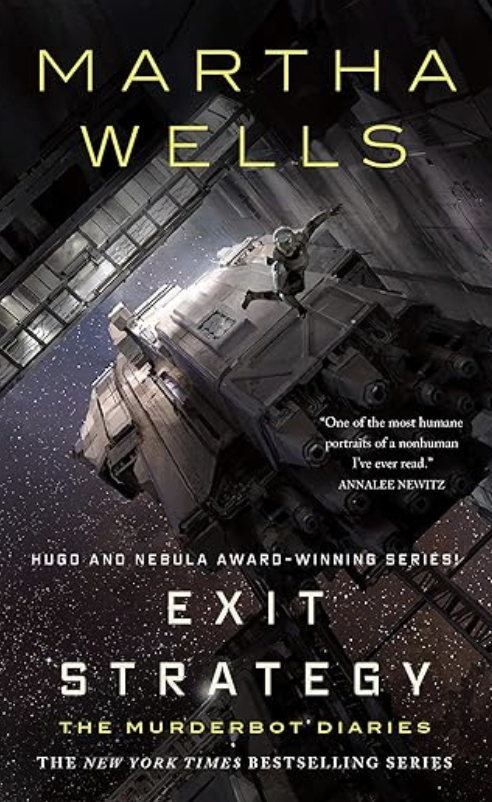Martha Wells’ *Exit Strategy*, the fourth installment in her acclaimed *Murderbot Diaries* series, continues the gripping saga of a security android grappling with its own identity and autonomy. This blend of action, humor, and introspection makes the series a must-read, and *Exit Strategy* is no exception. In this review, we will explore the narrative’s key elements, character development, and broader themes that resonate throughout Wells’ storytelling.
Synopsis
In *Exit Strategy*, we find our protagonist, the self-aware security android known as Murderbot, struggling with its evolving understanding of humanity and its own desires. After a series of harrowing experiences, Murderbot is thrust back into yet another conflict as it attempts to rescue a group of humans it has come to care about. The story balances urgency with depth of character exploration, showcasing Wells’ skill in crafting a narrative that is both engaging and thought-provoking.
Character Development
One of the most compelling aspects of *Exit Strategy* is the character development of Murderbot itself. Throughout the series, the android transitions from a creature focused solely on the tasks it was built for to one that exhibits emotional depth and agency. Murderbot’s internal monologue, infused with humor and sarcasm, steadily reveals a more profound yearning for connection and self-understanding. The relationships it builds with human characters further complicate its view of what it means to be “alive.” This evolution is a testament to Wells’ talent for creating multidimensional characters.The supporting cast, including Dr. Mensah and other members from previous entries, are also fleshed out in this book, providing rich contexts for interactions with Murderbot. These characters often serve as mirrors to Murderbot’s own struggles, emphasizing the themes of empathy and companionship.
Themes
*Exit Strategy* delves into several core themes that resonate deeply in today’s society:
- Autonomy and Identity: The struggle for self-determination is palpable in Murderbot’s journey. As it grapples with its identity beyond being a security unit, questions arise regarding consciousness and freedom.
- Human Connection: Wells explores the importance of relationships, both human and machine. Murderbot’s interactions highlight complex feelings of trust, loyalty, and emotional ties that bind individuals, regardless of their origins.
- Societal Commentary: The series critiques corporate control and exploitation, reflecting contemporary concerns regarding technology and its impact on humanity. Through Murderbot’s experiences, Wells critiques a world where profit often overshadows ethical considerations.
- Mental Health and Trauma: The narrative does not shy away from addressing the psychological toll of trauma, as seen through Murderbot’s reflections on past experiences and coping mechanisms. This portrayal resonates with readers who have grappled with their own mental health struggles.
- The Nature of Humanity: At its core, Exit Strategy raises questions about what it means to be human. Through the lens of a robot questioning its purpose, Wells invites readers to reflect on their existence and the qualities that define humanity.
Writing Style and Tone
Martha Wells’ writing style in *Exit Strategy* is crisp and engaging. The blend of witty humor with serious undertones creates a unique juxtaposition that keeps readers invested. The pacing balances action scenes with quieter moments of introspection, and Wells’ ability to convey complex emotions straightforwardly enhances the relatability of her characters, making their journeys resonate deeply.
Broader Implications
*Exit Strategy* is more than just a science fiction narrative; it poses broader questions that extend beyond the universe of the *Murderbot Diaries*. The themes explored in this installment invite readers to consider pressing issues in our world:
- How do we define autonomy in an era of advancing artificial intelligence? As technology continues to develop, the line between machine and human becomes increasingly blurred. What rights should sentient beings possess?
- What role do relationships play in forming our identities? The interdependence of relationships in shaping who we are highlights the importance of community and connection in a fragmented world.
- How can literature explore complex social issues such as corporate ethics and mental health? The narrative provides a lens through which we can examine ethical dilemmas present in our society, pushing readers to reflect on their values and actions.
- In what ways can science fiction serve as a critique of contemporary society? Wells’ work exemplifies how speculative fiction can challenge current societal norms and provoke critical thought about our future.
- What does it mean to confront one’s trauma in the quest for self-actualization? The exploration of mental health through a science fiction lens can provide insights into our understanding of trauma and recovery.
Conclusion
*Exit Strategy: The Murderbot Diaries* stands out as a poignant exploration of identity, autonomy, and the human experience through the eyes of a non-human protagonist. Martha Wells masterfully weaves action and introspection, immersing readers in a world that both entertains and challenges. As we follow Murderbot’s journey toward self-discovery and connection, we are left to ponder our own relationships, values, and the ever-shifting landscape of what it means to be alive. This installment not only cements *The Murderbot Diaries* as a significant work of science fiction but also invites readers to think deeply about the implications of technological advancement and the essence of humanity.

